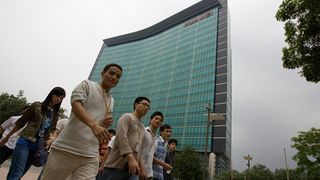Huawei to throw hundreds of millions at 5G research over five years
Will allow speeds up to 100x faster than 4G networks

Huawei's incumbent CEO, Eric Xu, has announced that the Chinese networking giant will be committing a whopping $600 million (£370m) to resources dedicated to research and development in next generation wireless network technology, commonly known under the umbrella term "5G".
The company, who is better known for its mobile devices but also provides enterprises worldwide with networking technology, said that the investment would be carried out over five years.
5G technology, Huawei said, would allow speeds of up to 100x faster than the 4G networks that are in operation in the UK and may be rolled out commercially by the end of the decade, something which is turning into a leitmotiv for the company.
At 10Gbps (on the 5GHz band), it would be as fast as the backplanes of most servers used in data centres. Beyond speed, Xu also reckons that the technology will allow even more devices to be connected, many of which being part of the Internet-of-things ecosystem.
- Broadband deals: compare the cheapest prices
Speed bump
EE teamed up with Huawei earlier this week to launch the first LTE advanced network in the UK with a theoretical speed on up to 300Mbps, a tenfold improvement on EE's 4G speeds at launch. Shame that no mobile devices can actually take full advantage of that speed bump unless they connect to a compatible hotspot via 802.11ac.
Other than Huawei, Samsung and NTT Docomo have also jumped on the 5G bandwagon and late last year, the Chinese company joined forces with Telefonica and Fujitsu to partner on a new £35m 5G research centre in collaboration with the university of Surrey.
Earlier this year, European Commission Vice President Neelie Kroes went even further saying that she wants 5G to be pioneered by the European industry. The EU has spent well over £600m over the past six years on 4G and next generation wireless technologies.
Are you a pro? Subscribe to our newsletter
Sign up to the TechRadar Pro newsletter to get all the top news, opinion, features and guidance your business needs to succeed!
- Be in the know. Here's everything you need to know on 4G and LTE

Désiré has been musing and writing about technology during a career spanning four decades. He dabbled in website builders and web hosting when DHTML and frames were in vogue and started narrating about the impact of technology on society just before the start of the Y2K hysteria at the turn of the last millennium.
Most Popular
